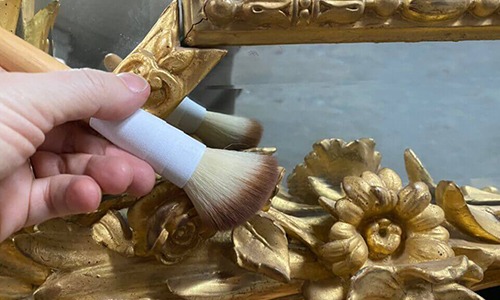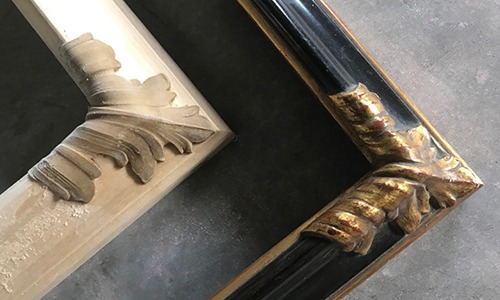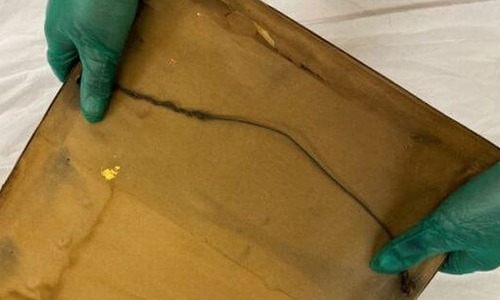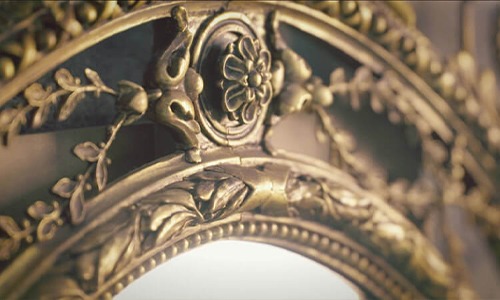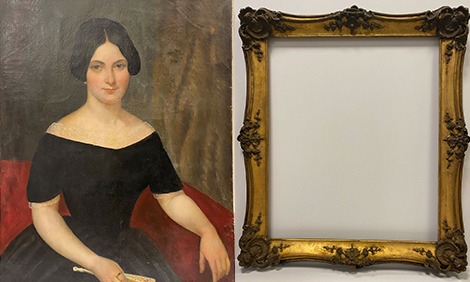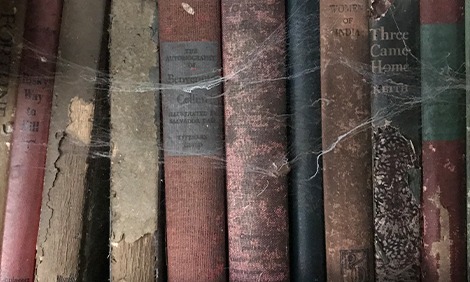
April Hann Lanford, Principal of Artifact Services
Fire Protect Your Collectibles
By April Hann Lanford
What to do if your valuable collectibles are threatened by fire.
This year has brought on elevated temperatures and created an environment susceptible to wildfires. Fires have devastated California and Colorado and are currently forecasted to worsen.
With any fire situation, the best approach is to evacuate items to safety beforehand. You may, however, face limitations of time, packing materials, and secured, secondary space to relocate items from your collection.
I have assisted in the evacuation and recovery of fire-damaged collections over the past fifteen years. If you need to evacuate and need to leave your collection behind, here are a few recommendations to help protect your pieces, and assist with potential recovery in the future:
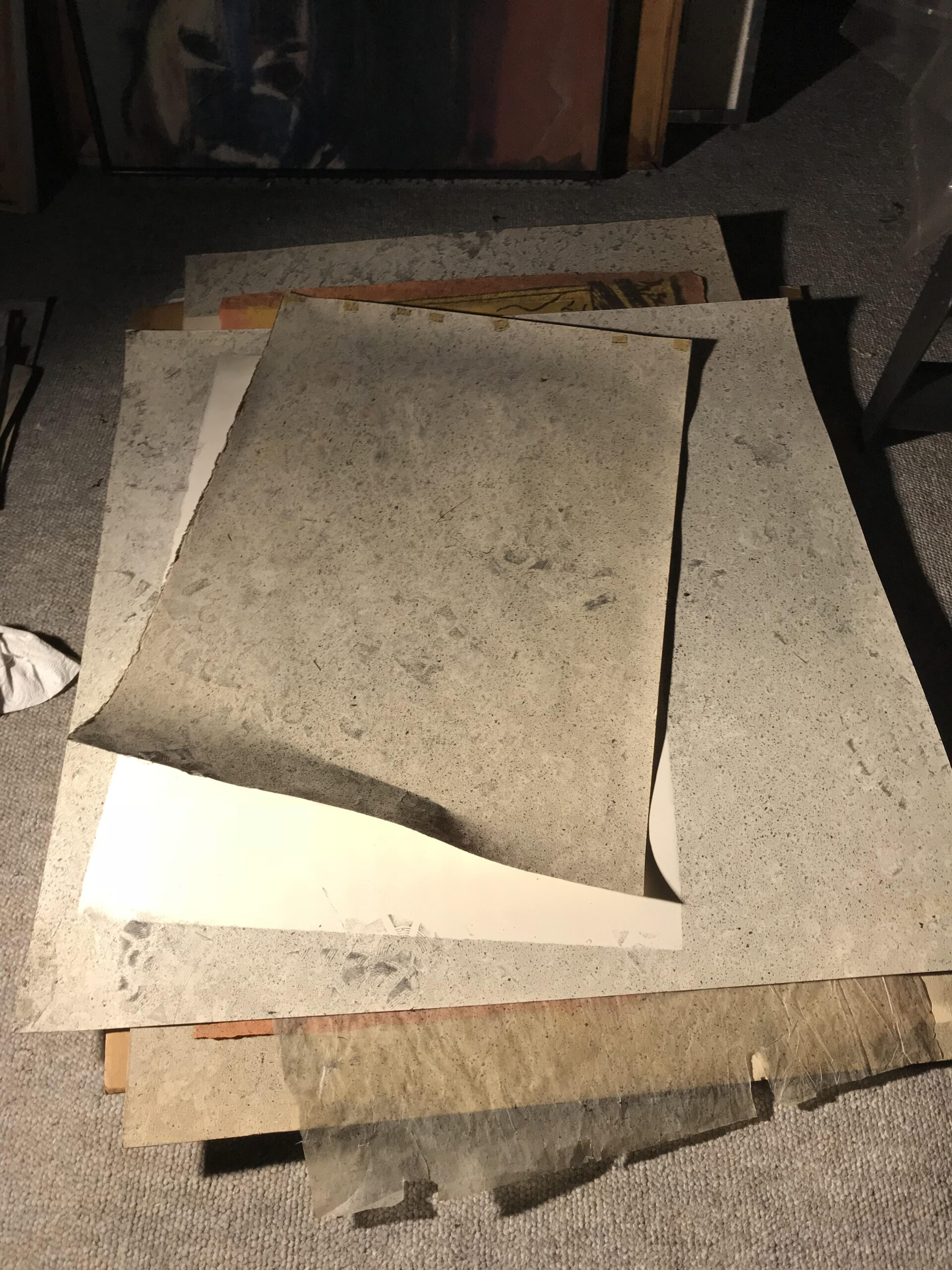
A piece of artist paper acted as a barrier against soot that partially protected the sheet below. Covering items before evacuating can be an effective measure to reduce exposure.
– Maintain an updated collection inventory and have a digital copy available to share. If needed, a digital copy makes it easy to share pertinent information with your insurance broker, adjuster, and specialists during the evacuation or recovery process.
-Identify 3-5 priority items for evacuation or immediate recovery.
-Relocate items to interior rooms, away from exterior walls, windows, and exterior doors. Outdoor smoke can infiltrate windows and seams. Windows are also vulnerable to breakage, which could cause further damage to adjacent pieces.
-Items should be elevated off the floor by three inches or higher. Elevating items prevent a piece from direct contact with standing water if water is used to put out a fire.
-Photograph or video the collection for future reference. If recording video, walk through the house, open drawers, cabinets, closets to document their contents. This is not only helpful for antiques and fine art but also will aid with other items in the event you have to make a claim.
-Designate a trusted local contact. This person can access and check on your home and collection in the event you are not able to.
Cover items to create an additional barrier. While there is not a universal fireproof material that works in all situations, having an additional cover such as heavy plastic sheeting or a tarp, can not only help protect from water from overhead but will also reduce the exposure to atmospheric soot. In the past, I have observed pieces of paper and cardboard protecting the surface of a piece, which protected the work, and simplified the resulting treatment.
Ideally, this last-minute prep is enough to prevent damage, and recovery efforts are not needed
The following are a few tips that I always keep in mind when recovering compromised collections after a fire loss.
Safety first: Check with local authorities to confirm that it is safe to return. Your personal safety is most important. In addition to the structural instability of buildings and homes, there is also the risk of flash floods and mudslides that might follow widespread fires.
Proper PPE: Before entering, make sure you are wearing the proper safety equipment for the environment. Heavy soled shoes, gloves and a mask are an absolute must.
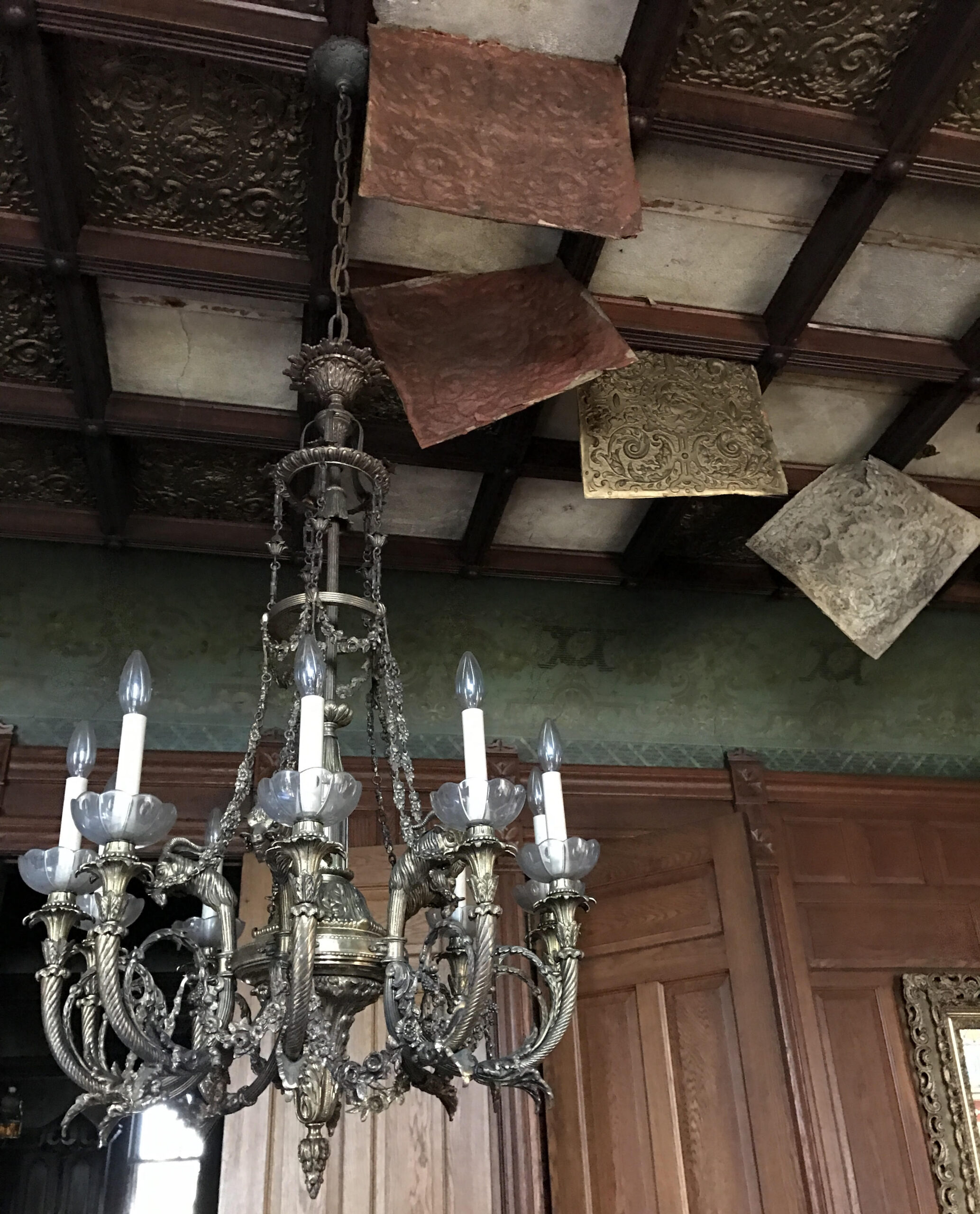
Antique ceiling tiles delaminating and falling from the ceiling are not only dangerous but are at risk of further damage, and potential loss, if recovery crews are unaware of their importance in this historic home.
Take your time: Remember that you are working in a compromised environment. There may be limited lighting, the structure will likely be compromised, there will be broken glass and debris to navigate on the floor. The items you are handling might also be compromised and require even greater attention when moving.
Be mindful of mold: Even though you are dealing with fire damage, items were likely exposed to water, and there may also be mold in the environment.
Remember to document: Upon arrival, document the space and collection with photos and video. This will help in a variety of ways: to track items, to identify the scope of damage as well as establish a timeline in the recovery process.
Prioritize: Create an inventory and identify priority items for care. Timing is critical during the aftermath of a fire. It is important to focus on the most important items first before proceeding with the rest of the collection.
Wear gloves: A simple rule is to always wear gloves when handling items exposed to soot. The oil on your fingers can cross-link with the soot and further embed the soot into the surface of the piece.
Handle with care: It’s always best to minimize the handling of items as much as possible. Soot is acidic and abrasive. Exposure to heat can also cause further instability to a surface. The more a piece is handled, the greater the risk of further damage.
Contact a conservator: The sooner damaged items can be addressed, the better the results for treatment. The longer soot is on a surface the harder it can be to successfully remove.
There are many variables to consider when safeguarding collections and recovering items after a fire loss. While a lot of collectors do not have access to offsite storage to safely evacuate their items when a wildfire looms, these preventive steps can go a long way. These days, even a sixty-second video walkthrough of a collection can significantly help with recovery efforts in the future.
During the aftermath when local resources for response and recovery are flooded, taking the proactive measures listed above can significantly impact the successful recovery of your collection.
The most important lesson to remember is to never assume that a piece is a loss. The field of conservation offers a combination of traditional techniques and modern technology, which can yield a lot of successful options for the treatment of a piece. The sooner an item can be addressed, the better the results.
Click here to view original article that was published in Antique Trader.
Fire Protect Your Collectibles, by April Hann Lanford
Our collection of educational articles about
custom framing, collection care, and emergency response are updated regularly.
Click on each topic below for a menu of corresponding articles.
Collection Care Articles
By April Hann Lanford
Our collection of educational articles provides an introduction to many topics about the preservation and conservation of fine art, antiques, and fine furniture.
Topics are often written as a result of questions provided by our clients.
Emergency Care Articles
By April Hann Lanford
Our emergency care articles are a helpful introduction to how to prevent damage through preventative measures or art and antique collections. When a disaster strikes, prompt response and taking the right steps can mitigate further damage.
Antique Trader Articles
By April Hann Lanford
Visit our collection of articles that have been published in Antique Trader.
antiquetrader
For more than 60 years Antique Trader has been inspiring, informing, and entertaining the collecting community with timely...
Projects
By April Hann Lanford
A selection of Artifact’s most recent projects highlighting our conservation and preservation work. We present each unique story describing the conservation process from reviewing the history, cause of loss, and condition to the steps of the treatment.
Glossary
A collection of art and conservation terms along with makers and firms compiled into a glossary and highlighted throughout our website for reference.
We are available to assist you
Main Location
840 N. Milwaukee Ave, Chicago IL 60642
Mon-Fri: 9:00 am - 5:30 pm
Sat: 10:00 am-4:00 pm
Sun: Closed
Complimentary parking is available in the loading zone in front of the building
We can also serve you by appointment at our other locations in the Chicagoland area.
Additional Locations
Schiller Park • Highland Park • Lake Forest • Lincoln Park • Nashville, TN
Copyright 2024, Artifact Services, LLC | An Artmill Group Company
